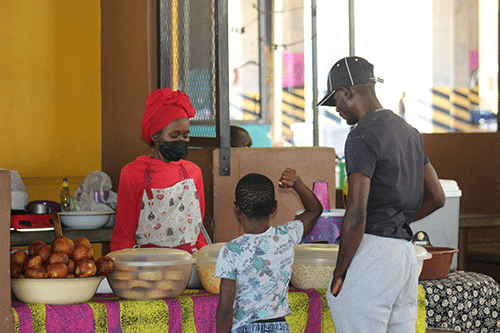Terence Mukasa
Siblings Aina and Hertha Shiyamba began helping their mother with her food stall under the Wernhil Park bridge when they were 14 and 19, respectively to help pay for their daily needs and school necessities.
Their father died when they were much younger and their mom started selling Oshikundu, vetkoek, bread, chicken, meat and chips back in the late 90s as a means to sustain her family.
When they were younger, the two used to help only during school holidays and weekends, but slowly took over the reins when they learned how to sell, handle money, and talk to customers. “We became more dedicated to helping her when we realised it is where our school fees, taxi fare to school and back, stationery and other bills to pay come from,” said Hertha (27). Their mom now only helps when they are at school.
Hertha is currently enrolled at the International University of Management in the education programme, while Aina (22) is a second-year nursing student at the Welwitchia Health Training Centre.
Aina told Youth Corner that many youth say selling at a market is embarrassing, but they don’t bother with what people think.
“We don’t care about anything negative said, because we are determined and focused on what we need to do. It’s the dedication and commitment that do not let the comments affect us,” she added.
The business-minded siblings also order and sell phones and clothes from China to supplement their income from the market.
Back then, they only used boxes as makeshift chairs and tables from where they sold food but since the market was renovated, they now have a table and fixed cement amenities, including potable water. They used to buy water from the nearest car wash businesses to cook their food at the stalls. Rent for the stall is now N$430; it used to be N$700 before the Covid-19 pandemic struck the world.
They said the Covid-regulatory lockdowns were also hectic on them because they could not sell at the market and thus could not earn income.
“We had to hope and wait for the restrictions to be lifted in order for us to resume our operations. It also meant that we had to use the money we had wisely,” said Hertha.
They plan on expanding their operations to a larger market while pursuing teaching and nursing careers.


